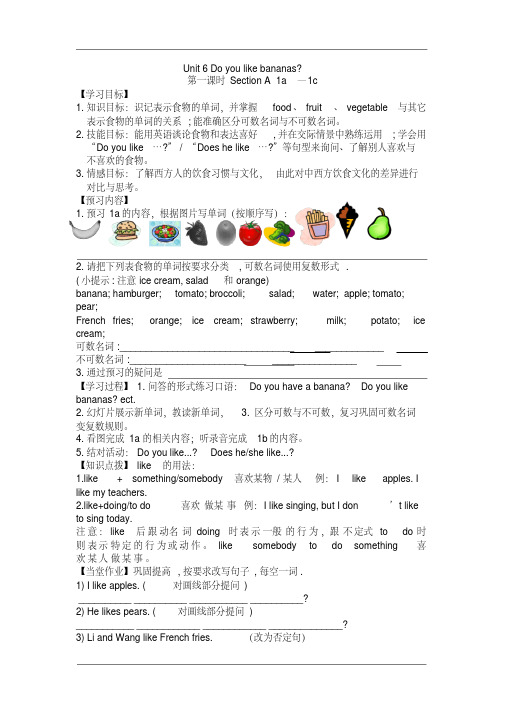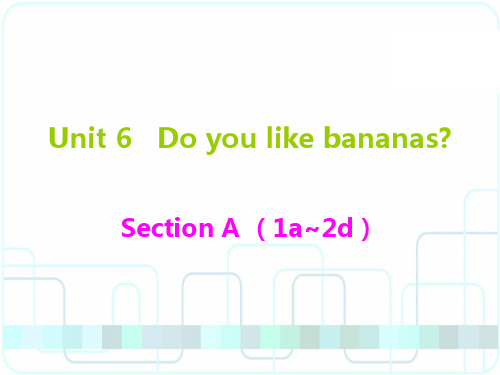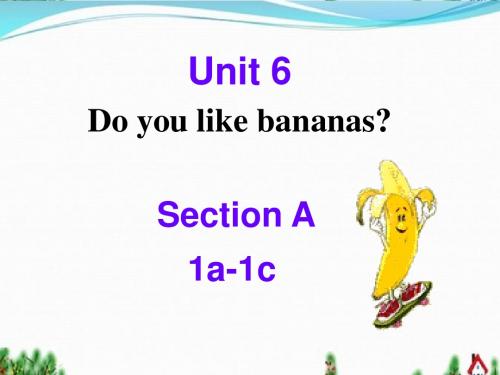七年级英语上册Unit6DoyoulikebananasSectionA1a_1c习题
七年级英语上册 Unit 6 Do you like bananas?Section A(1a2d)

?
答案: ①have/eat dinner ②have/eat breakfast
第二十一页,共24页。
Ⅰ. 用所给词的适当形式(xíngshì)填空
1. —
you
(like) hamburgers?
—Yes, I do. I like them very much.
2. Let’s
(go) to school with Li Lin and Wang Mei.
5. tomatoes
第二十二页,共24页。
Ⅱ. 单项选择(xuǎnzé)
1. Look! Some bread
in the bag and some apples
on
the table.
A. is; is
B. is; are
C. are; is
D. are; are
2. These are
burgers.
第十五页,共24页。
【自主归纳】以-o结尾加-es的可数名词 以-o结尾加-es的可数名词主要(zhǔyào)有以下几个:
Negro→Negroes黑人 hero→heroes英雄 potato→potatoes土豆 tomato→tomatoes西红柿
可用一句顺口溜记住: 黑人英雄爱吃土豆和西红柿。
*We have English at eight on Monday. 我们在周一八点上英语课。 *They will have a meeting tomorrow. 他们明天要开会。
第二十页,共24页。
【学以致用】
①让我们(wǒ men)吃晚饭吧。
Let’s
.
②你们什么时候吃早饭?
What time do you
人教新目标英语七上Unit6Doyoulikebananas教案4

Unit 6 Do you like bananas?第一课时Section A 1a—1c【学习目标】1.知识目标:识记表示食物的单词,并掌握food、 fruit、 vegetable与其它表示食物的单词的关系;能准确区分可数名词与不可数名词。
2.技能目标:能用英语谈论食物和表达喜好,并在交际情景中熟练运用;学会用“Do you like…?” /“Does he like…?”等句型来询问、了解别人喜欢与不喜欢的食物。
3.情感目标:了解西方人的饮食习惯与文化,由此对中西方饮食文化的差异进行对比与思考。
【预习内容】1.预习1a的内容,根据图片写单词(按顺序写):2.请把下列表食物的单词按要求分类,可数名词使用复数形式.(小提示:注意ice cream, salad和orange)banana; hamburger; tomato; broccoli; salad; water; apple; tomato; pear;French fries; orange; ice cream; strawberry; milk; potato; ice cream;可数名词:_________________________________ _____________不可数名词:______________________ ________________3.通过预习的疑问是【学习过程】1.问答的形式练习口语:Do you have a banana? Do you like bananas? ect.2.幻灯片展示新单词,教读新单词,3.区分可数与不可数,复习巩固可数名词变复数规则。
4.看图完成1a的相关内容;听录音完成1b的内容。
5.结对活动:Do you like...? Does he/she like...?【知识点拨】like 的用法:1.like + something/somebody 喜欢某物/某人例:I like apples. I like my teachers.2.like+doing/to do喜欢做某事例:I like singing, but I don’t like to sing today.注意:like后跟动名词doing时表示一般的行为,跟不定式to do时则表示特定的行为或动作。
人教版七年级上册英语例题与讲解:Unit6DoyoulikebananasSectionA

初中英语学习材料madeofjingetiejiUnit 6 Do you like bananas?突破词汇 Section A sure adv . 当然;肯定;一定→P95 Section B breakfast n . 早餐;早饭 →P102 How about...?(提出建议)……怎么样?→P96 healthy adj . 健康的 →P103 Section B eat v . 吃→P101 want v .需要;想要 →P103 well adv . 好;令人满意地→P102 fat adj . 肥的;肥胖的 →P104 把握句型 1.Do you like oranges?你喜欢橙子吗?2.Sure.How about burgers ,vegetable salad ,and some fruit?好吧。
咱们吃汉堡、蔬菜沙拉和水果怎么样?3.I don't want to be fat.我可不想变胖。
熟悉 语法 1.实义动词的一般现在时。
2.名词。
学会 交际 学会在日常生活中谈论好恶。
写作 练笔 学写某人喜爱或厌恶某物的短文。
Section A2dJack :Hey ,John's birthday dinner is next week.[1]Let's think about the food. Tom :[2]Sure.How about burgers ,vegetable salad ,and some fruit? Bill :Sounds good.John likes hamburgers.Jack :Oh ,I don't like salad.Bill :But John likes salad ,and it's his birthday.Jack :Yes ,you're right.What about the fruit?Tom :I think John likes strawberries and apples.Bill :OK.[3]Let's have strawberries and apples then.2d杰克:嗨,约翰的生日聚餐就在下周。
七年级人教版英语上册Unit6Doyoulikebananas?全单元教案

Unit 6Do you like bananas?Period 1(Section A 1a-1c)Teaching aims1. Learn words and be able to say, read and write them:orange(s), banana(s), strawberry, strawberries, pear(s), apple(s),tomato(es), carrot(s), vegetable(s), hamburger(s), egg(s), ice-cream(s),salad(s), bread, chicken2. Be able to talk about likes and dislikes by using:I/We/They like oranges. He/She likes oranges.I /We/They don’t likebananas. He/She doesn’t like hamburgers.Do you like salad? Yes, I do./No, I don’t.Does he/she like tomatoes? Yes, he/she does. / No, he/she doesn’t.3.Understand the difference between countable nouns and uncountable nouns.Teaching key and difficult points:1.Learn these words and be able to say, read and write them:2.Be able to talk about likes and dislikes by using:I/We/They like oranges. He/She likes oranges.I /We/They don’t likebananas. He/She doesn’t like hamburgers.Do you like salad? Yes, I do./No, I don’t.Does he/she like tomatoes? Yes, he/she does. / No, he/she doesn’t. Moral objects(1)To call students ’ attention to otherserests and’ei n ablet themto care more about classmates.(2)To improve Sts ’communicating skills and enable them to keeptheir health.教学设计备注Step 1. Warm-up and revision(1)Daily greeting to the students(2)Revision: What ’s this/that in English ? What coloris it?T:What ’s this in English? (show a picture of andorange)T:What color is it?Step 2. Presentation –New words.(1)Go on asking: What ’s this/that in English ? Whatcolor is it?T:What ’s this in English? (show a picture of anapple and if the student don’t know it, show thephonetic symbol of the word.)T: Spell it, please.S: A-P-P-L-E.T: What color is it?S: It ’s red.(Present the other three words as above: pear,strawberry, banana )T:We can call all of these things fruit . (Teach the newword “fruit ”.)Show pictures and ask the Ss “What arethese/those? ”and ask the SS to spell the pluralforms of these words: oranges, apples, pears,strawberries, bananas.(2)Repeat step (1) to present: carrot, carrots,tomato, tomatoes and vegetable, vegetables.(3)Present some more words by showing pictures. Get theSs to make an effort to pro nounce and spell the new words.Bread, hamburger ,hamburgers, milk, ice-cream,ice-creams, salad, chicken ,an egg, eggsWe can call all of these things food:食物3.Memory Challenge: Who has the best eyes?(1)Show the pictures, and say the plural forms of the nouns andsome uncountable noun.(2)Summarize. 可数名词有复数形式 , 不可数名词一般没有复数形式Step 3Presentation Target language 11. Show the pictures and say:I like tomatoes, but I don’ t like bread.2.Let students say:I like, but I don’t like ....3. Show the pictures and say:She likes bread, but she doesn’t like milk.He likes chicken, but he doesn’t like eggs.4.Let students say: He/She likes , but he/she doesn’tlike ....According Ss’answers and say:5. Sing a chant:Bananas, bananas, I like bananas! Salad, salad, I like salad!Strawberries, strawberries,I don ’t like strawberries!Pears, pears, he likes pears!Milk , milk, he likes milk!Tomatoes, tomatoes,He doesn ’t like tomatoes! Step 4 Work 1a .1. Read the words.2.T: Look at the pictures and fill in the chart .Fruit Food Vegetable3.Match the words with the things in the picture.4.Check the answers .Step 5 Present the new language 1 .1. T: Oh, we have lots of delicious fruits . I like apples best.Do you like apples ?S1 :Yes , I do. I like apples.S2: No, I don't . I like salad.T: Do you like salad ? S3: Yes , I do. I like salad./ No, I don't . I don’tlike salad.Step 6 Pairwork .1. T: Work in pairs .Ask and answer with your partners .(Before class the students have draw some pictures of the food )2. Get the Ss to ask and answer in pairs, using the sentences:’t.A: Do you like ?B: Yes, I do./ No, I don 3. When you ask andanswer, please fill in the chart. Name Like DislikeStep 7 Present the new language 2 .1.Show pictures and ask and answer questionsDoes she/he like ?Yes, she/he does. She/He likes/ No, she/he doesn ’t. She/He doesn ’tlike .Step 8 Pairwork .1. T: Work in pairs .Ask and answer with your partners .2.Get the Ss to ask and answer in pairs, using the sentences:Does she/he like ?Yes, she/he does. She/He likes/ No, she/he doesn ’t. She/He doesn ’tlike .3.According Ss’answers and ask “Do they like ? Yes, they do./ No, they don’t.”Step 9 Work on 1b.1.T: 1b. List en and number the conversations.2.Listen.3.Check the answers.4.Read after the tape.Step 10 work on 1c.1.First, practice the conversations in 1b.Then, make a survey and fill in the chart below.2. Report: I like milk and tomatoes, but I don’t like ice-cream. Mary likes oranges, but she doesn’liket milk orice-cream. Tom likes tomatoes and strawberries, but hedoesn ’ t like bread.Step 11 . HomeworkWrite down the report.Blackboard design:New Words Unit 6 Do you like bananas?Do you like?Yes , I do. I likeNo ,I don ’t. I don ’tlikeDoes she/he like ?Yes, she/he does. She/He likes/No, she/he doesn ’t. She/He doesn ’tlike.Period 2(Section A 2a-2d)Teaching aims:1. Words & expressionsBirthday, dinner, week, think about, food, sure, how/whatabout ? Burger, vegetable, fruit, apple, then2. Target languageI like strawberries, they’re delicious. Let’s have them.--Yes, I like them ,too./ No, I don’tlike them.I like salad, it ’s delicious. Do you like it?-- Yes, I do./No, I don’t but I likeice cream.Let ’ s have Let ’s think about the food.Ability goalsEnable students to talk about likes and dislikes.Learning ability goalsHelp students learn how to talk about likes and dislikes.2. Listening and speaking skills.Moral object:Learn to keep healthy.Teaching important / difficult pointsHow to talk about likes and dislikes with the target language.教学设计备注Step1 Warm up and revision.1.Everyday greeting.2.Review.Show the pictures and say the singularforms and the plural forms of the countable nouns.3.Show some pictures of the uncountable nouns.4.Summarize.(1).当可数名词复数再次出现时,用“They( 主语)或 them(宾语)”替代。
人教版英语七年级上册Unit6DoyoulikebananasSectionA1a1c公开课课件

__D_o__ you ___li_k_e___ strawberries?
× No , I _d_o_n_’_t_ . I _d__o_n_’_t_ __l_ik_e___ strawberries. _D__o_ you like _m__il_k? No, I __d_o_n_’_t__. × I __d_o_n_’_t_ like milk.
Test your eyes:
(测测你的眼力)
1a Can you match the words with
the things in the picture?
1. hamburgers d 2. tomatoes i 3. oranges f 4. ice-cream h 5. salad b 6. bananas g
7. strawberries c
8. pears j 9. milk e 10.bread a
I like …
I don’t like …
do not = don’t
Do you like apples?
Yes, I do. I like apples.
No, I don’t. I don't like apples.
Do you like strawberries?
Yes, I do. I like strawberries.
No, I don’t. I don't like strawberries.
Do you like bananas?
Yes, I do. I like bananas.
No, I don’t. I don't like bananas.
Do you like ice-cream?
七年级 unit 6 do you like bananas Section A 1

bread
salad
ice-cream
1a
Match the words with the things in the picture.
1. hamburgers d 2. tomatoes i 3. oranges f 4. ice-cream h 5. salad b 6. bananas g 7. strawberries c 8. pears j 9. milk e 10. bread a
1b
2
Listen and number the conversations [1-3].
1
3
A: Do you like salad? B: No, I don’t.
A: Do you like bananas? B: Yes, I do.
A: Do you like oranges? B: Yes, I do.
Section A 1a~2b
浔溪中学 任圆圆
What’s this\that? It’s a\an…
— What are these\those? — They are _________. bananas
tomatoes
oranges
strawberries
pears
hamburgers
— What’s this\that? — It’s _____. milk
2b
Listen again. Fill in the blanks.
— Do you like tomatoes __________? — No, I don’t like
— I like hamburgers. Do you like hamburgers? —Yes, I do.
七上Unit6_Do_you_like_bananas(section_A)

Do they like strawberries ?
Yes , they do .
They like strawberries .
Does he like milk … ?
Yes , he does .
He likes milk.
Rewrite the sentences:
1. His brother has lunch at home.否定句
Revision
Unit 6 Do you like bananas?
Do you like fruit?
What fruit do you like ?
一天一苹果,医生远离我
What's it ?
It's a banana.
What's it ?
It's a pear.
What's it ?
Yes,I do. Do you like salad?
No,I don’t. Do you like oranges?
Yes,I do.
可数名词 定义:是可以计数的名词。 ( 1) 可数名词前可以用 a , an 限定,表一个….。 ( 2) ( 3) 可数名词前可以用 one, two , three… 限定。 ( 4) 可数名词有复数形式。 不可数名词
a strawberry strawberries
a tomato
tomatoes
a hamburger
hamburgers
What are these?
They are bananas
Do you like bananas?
Yes,I do. No, I don't.
新目标人教版七年级英语上册Unit 6 Do you like bananas Section A (1a—1c)优秀说课稿

新目标人教版七年级英语Unit6 Do you like bananas? Section A (1a—1c)说课稿说课教师:授课班级:授课时间:今天我说课的内容是新目标人教版七年级Unit6 Do you like bananas? Section A ( 1a-1c). 我将从教材分析、教学目标、教学重难点、教学过程四个部分进行说课。
一、说教材分析:本单元既是新知,也是对旧知的复习与提升。
在Unit5 这个单元中,学生学过Do you have…?Yes, I do. / No, I do n’t. 的句型,并初步掌握了一般疑问句的结构及答语。
而我所执教的Unit 6 这一单元,Do you like…?是要求学生们能够询问别人是否喜欢某物。
两个单元具有相似点:Do you …? Yes, I do. / No, I do n’t.的句型来询问并应答;同时又具有不同点:谈论话题不同,第5单元以体育用品为主题谈论某人是否拥有某物,而第6单元则以食物为主题谈论个人喜好;知识词汇不一样;情感态度价值观不同。
二、说教学目标:A.知识与技能:1、关于水果的词汇;表达喜好的结构;能听说、认读单词:apples, milk, salad, tomatoes, bread, hamburgers….2、掌握句型:Do you like …?及回答Yes, I do. / No, I do n’t.B.过程与方法:1、通过创设情境,歌谣,游戏等活动,学会询问别人喜欢或不喜欢的食物,如:Do you like …?并能作出应答。
2、能够和组员合作,通过演一演的方式把知识内化。
C.情感、态度与价值观:1、情感态度:该部分学习内容贴近学生的生活,谈论的主题涉及学生的饮食习惯和偏爱,极易于激发学生学习英语的欲望和兴趣。
2、学习策略:采取小组合作学习的方式,培养同学间相互沟通和交流的能力。
三、说教学重难点:根据教学大纲要求,教材编排特点,并从学生的实际出发,我将本课的重点与难点确定为:重点:1、关于食物的词汇;能听说、认读单词:apples, milk, salad, tomatoes, bread, hamburgers….2、掌握句型:Do you like …?及应答:Yes, I do. / No, I do n’t.难点:根据创设情境运用句型“Do you like …?”及应答。
七年级英语上册 Unit 6 Do you like bananas(第1课时)Section A(1a-2d)课件 (新版)人教新目标版

some意为“一些”。用于修饰可数名词复数以 及不可数名词。 一般用于肯定句中。
She has some nice skirts.她有一些好看的裙子。
(1)通常情况下, 在否定句和疑问句中, 要将some改为any 。
Do you have any milk?你有牛奶吗?
后面可以接very much, a lot, a little, not…at all 等表程度的词。
Jerry likes Chinese food very much. 杰里非常喜欢中国的食物。
like还可作介词,意为“像”。 一般位于be动词或其他动词之后 。like后接名词或代词作宾语。
The girl looks like her father. 这女孩长得像她爸爸。
bananas
2b Listen again. Fill in the blanks.
hamburgers
tomatoes
ice-cream ice-cream
tomatoes
2c Practice the conversations above. Give answers
that are true for you.
1.Do you like bananas?你喜欢香蕉吗?
询问某人的喜好,常用句型:Do/Does+主语+ like+…? 意思是“某人喜欢……吗?”
肯定回答用:Yes,主语+ do/does; 否定回答用:No,主语+don’t/doesn’t.
like是及物动词,意为“喜欢”。 like +sb. /sth. /doing sth. /to do sth. 意为“喜欢某人/某物/做某事”。
2015 新目标英语七年级上 Unit 6 Do you like bananas .

4. She doesn’t have pears in her bag. (改为肯定句) has She _________ pears in her bag. 5. Tommy and Sally like ice cream. (对划线部分提问) _________ What do Tommy and Sally ____? like
三. 请根据括号内要求完成句子,每空一词 (含缩写)。 1. Does Nick like bananas? (作否定回答) ___ No , __________ he doesn’t . 2. They like oranges. (改为否定句) They ___________ don’t like oranges. 3. Do you like salad? (作肯定回答) ____ Yes , __________ I / we do .
Yes, she does. She likes bananas. No, she doesn't. She doesn’t like …
2a Listen and circle the food you hear.
hamburgers
pears
tomatoes
strawberries
oranges
Unit 6 Do you like bananas? Section A 2a—2d
Do you like hamburgers? they Tom and Sally
Yes, I / they do.
No, I / they don’t.
What does she ike? Does she like…
IV. Exercise
一. 按要求写出下列单词 1. watch(复数)________ watches 2. carrot(复数)________ carrots 3. sound(第三人称单数)_______ sounds 4. tomato(复数)________ tomatoes 5. I(宾格)____ me 6. it is(缩写)_____ it's
人教版英语七年级上册 Unit 6 Do you like bananas

This is a fruit and vegetable house (果疏屋). What’s in the house? (果蔬屋里有什么?)
some vegetables
some fruits
banana bananas
pear pears
strawberry strawberries
2 A: Do you like salad? B: No, I don’t.
1 A: Do you like bananas? B: Yes, I do.
3 A: Do you like oranges? B: Yes, I do.
Post-listening
1c Practice the conversations with your partner. Then make your own conversations.
2. tomatoes __i _ 3. oranges _f__ 4. ice-cream _h__ 5. salad __b_ 6. bananas _g__
7. strawberries __c_ 8. pears __j_
9. milk __e_ 10. bread _a__
Read the dialogue in the picture.
Read the conversation after the tape.
1. Girl: I like hamburgers. Do you like hamburgers? Boy: Yes, I do.
2. Girl: Do you like tomatoes? Boy: No, I don't like tomatoes.
—Do you like bananas? —Yes, I do. —Do you like salad? —No, I don’t. —Do you like oranges? —Yes, I do.
Unit6.1 Do you like bananas?(Section A)-七年级英语人教版(上册)(解析版)

Unit 6 Do you like bananas?课时1 Section A(满分:100分时间:40分钟)一、根据句意及汉语提示填写单词。
(共10小题,每小题2分,共20分)1. What ________ (食物) does your son like?2. Some ________ (鸡蛋) are under the sofa.3. We can see three ________ (胡萝卜) on the table.4. Tina doesn’t like ________(米饭). What about you?5. —Here is some ________(鸡肉) for you.—Thank you.6. Do you like ________(汉堡包)?7. I don’t like ________(冰激凌).8. Her sister doesn’t like ________(梨).9. Alan likes ________(牛奶).10. Does Jim like ________(沙拉)?【答案】1. food2. eggs3. carrots4. rice5. chicken6. hamburgers7. ice-cream8. pears9. milk 10. sala二、根据教材原文完成句子。
(共5小题,每小题2分,共10分)1. ——你喜欢橙子吗?——是的,我喜欢。
—________ you like ________?—Yes, I ________.2. 让我们考虑一下食物。
Let’s ________ ________ the food.3. 汉堡包……怎么样?________ ________ burgers...?4. 我认为约翰喜欢草莓和苹果。
I think John ________ ________ and apples.5. 我喜欢水果,但是我不喜欢蔬菜。
人教版七年级英语上册教学课件:Unit 6 Do you like bananas(共90张PPT)

课堂练习
三、根据汉语意思完成句子,每空一词 1. 你喜欢草莓吗? Do you ___li_k_e__ ___s_tr_a_w_b__e_rr_ie_s___? 2. ——你喜欢苹果吗? ——不,我喜欢梨。 —Do you __li_k_e__ __a_p_p_le_s_? —No, I __d_o__n_'t__. I __li_k_e__ __p_e_a_r_s__.
Unit 6 Do you like bananas?
Section A (1a~2d)
课前导学
核心单词 1. ___b_a_n_a_n_a____ n. 香蕉 2. ____h_a_m_b_u_r_g_e_r____ n. 汉堡包 3. ____t_o_m_a_t_o____ n. 西红柿 4. ___i_c_e_-c_r_e_a_m____ n. 冰激凌 5. ____s_a_l_a_d___ n. 沙拉 6. __s_t_r_a_w_b_e_r_ry____ n. 草莓 7. ____p_e_a_r____ n. 梨 8. ____m_i_lk______ n. 牛奶
要点梳理
2. sure的用法 【教材例句】—Let's think about the food. 让我们来 想想(吃什么)食物吧。 —Sure. 当然。 (教材第32页) 【要点思维导图】
要点梳理
【举例】 —Can you help me? 你能帮我吗? —Sure. 当然可以。 I am sure he can come to my birthday party. 我确信 他会来参加我的生日聚会。
要点梳理
2 句型“How about …?”的用法 【教材例句】How about burgers, vegetable salad, and some fruit? 汉堡包、蔬菜沙拉和一些水果怎么样? (教材第32页) 【用法】“How about …?”意为“(提出建议)…… 怎么样?”,用于提出建议或请求,相当于“What about …?”,其中about为介词,后接名词、代词或 动词-ing形式。
七年级上册 Unit 6 do you like bananas课件Section A 1a-1c (非三人称)

Do you like hamburgers? they Tom and Sally
Yes, I do. No , I don’t.
Yes, they do. No , they don’t.
Yes, they do. No , they don’t.
Do you
they Tom and Sally
1a Match the words with the things in the
picture. 1. hamburgers __ d i 2. tomatoes __ f 3. oranges __ 4. ice-cream h __ b 5. salad __ g 6. bananas __ 7. strawberries __ c j 8. pears __ 9. milk __ e a 10. bread__
Ice cream
I like…but I don’t like…
Exercise
一、选词填空。
√ 1. Do you like ___ (strawberry/strawberries)? √ 2. Here are some nice ___ (tomatos/tomatoes). √ / has) apples and bananas. 3. Let’s ___ (have
1c Pairwork
Practice the conversations above. Then make your own conversations. A: Do you like pears? B: No, I don’t. A: Do you like tomatoes? B: Yes, I do.
III. Translate and write them down. 1. - 你喜欢沙拉吗? - 我不喜欢。 - Do you like salad? - No, I don’t. 2. 我喜欢花椰菜,但我不喜欢炸薯条。 I like broccoli, but I don’t like French fries.
咸阳市第一中学七年级英语上册 Unit 6 Do you like bananas第一课时 Sect

(五)根据汉语意思完成以下句子。(5×5分=25分) 21.那些是西红柿。 Those ___a_r_e___ t_o_m_a_t_o_e_s_. 22.——你喜欢牛奶吗 ? ——是的 , 我喜欢。 —__D_o_____ you like milk? —Yes , _____I___ __d_o_____. 23.——她喜欢沙拉吗 ? ——不 , 她不喜欢。 —_D_o_e_s____ she like _s_a_l_a_d___ ? —No , _s_h_e_____do_e_s_n_'_t___.
24.八个梨在桌子上。 ___E_i_g_h_t_ ___p_e_a_r_s_ ___a_r_e___ on the table. 25.我的妹妹和我不喜欢汉堡包。 My sister and I __d_o_n_'_t__ __l_i_k_e___ h_a_m_b_u_r_g_e_r.s
四清导航
D. look
【答案]B
Summary
Words: sound; great;interesting Sentences:let's...& do you have...
Exercise
单项选择
( C )1.He ______baseball.
A. don‘t play
B. doesn’t plays
English is ___A____, but I am only ______ in Chinese. A.interesting/interested B. interesting/ interesting C. interested/ interested D. interested/ interesting
Unit6Doyoulikebananas_SectionA1a-1c导学人教版七年级英语上册

Unit 6 Do you like bananas?Section A Period 1Name: _______ Class: ________ Group: _______【学习目标】1.通过图片认读练习,掌握食物类单词准确读音:hamburger , tomato , orange, icecream, salad, banana, strawberry,pear, milk, bread,2. 通过对食物单词的分类,学会区分可数名词与不可数名词,并总结可数名词单数变复数的规则变化规律。
3.通过句子对话训练,会运用以下句型陈述或询问对方或他人对不同食物的喜恶:①I like ... I don’t like ...He/She likes ... He/She doesn’t like ...②Do you like...? Yes, I do./No, I don’t.Does she/he like...? Yes, he/she does./No, he/she doesn’t.【导学流程】一、独立深思Task 1. (1)完成1a,将单词与图中物品匹配。
(2)观察下列名词,并给名词进行分类a banana two bananas a hamburger five hamburgersa tomato some tomatoes a potato (土豆)some potatoesa strawberry many strawberries a pear a lot of (许多) pearsbread some bread milk some milksalad some salad a salad icecream some icecream two icecreamsMilk is good. Apples are good,too.(3)I like _____________(orange). I like _____________(milk).I like ____________(sport). I like _____________(basketball).【总结】like“喜欢”后跟可数名词复数或不可数名词原形;表示喜欢一类事物Task 2: 朗读并总结相对应的句型结构(1)I like oranges. He likes oranges.They like oranges. Lucy likes oranges.肯定句结构:问题:在肯定句中当主语是哪些人称时用like?__________________________ 当主语是哪些人称时用likes?__________________________ (2)I don’t like oranges. He doesn’t like oranges.They don’t like oranges. Lucy doesn’t like oranges.否定句结构:思考:do/does是________,帮助构成______ 句和_______句.don’t = ____ _____ doesn’t = _____ _____(3)Do you like oranges? Yes,I do. / No, I don’t.Do they like oranges? Yes,they do. / No, they don’t.Does he likes oranges? Yes,he does. / No, he doesn’t.Does Lucy likes oranges? Yes,she does. / No, she doesn’t.一般疑问句结构:肯定回答:否定回答:(4)What do you like? I like oranges.What does he like? He likes oranges.特殊疑问句结构:二、合作探究Task 1. 小组内讨论疑惑和独立深思的答案。
